成人高等教育学士学位英语水平考试大纲非英语专业
成人高等教育本科生学士学位英语水平考试大纲(非英语专业
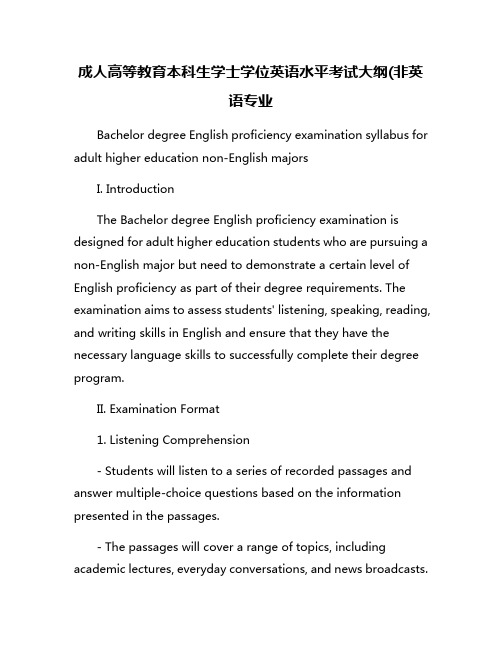
成人高等教育本科生学士学位英语水平考试大纲(非英语专业Bachelor degree English proficiency examination syllabus for adult higher education non-English majorsI. IntroductionThe Bachelor degree English proficiency examination is designed for adult higher education students who are pursuing a non-English major but need to demonstrate a certain level of English proficiency as part of their degree requirements. The examination aims to assess students' listening, speaking, reading, and writing skills in English and ensure that they have the necessary language skills to successfully complete their degree program.II. Examination Format1. Listening Comprehension- Students will listen to a series of recorded passages and answer multiple-choice questions based on the information presented in the passages.- The passages will cover a range of topics, including academic lectures, everyday conversations, and news broadcasts.- Questions will test students' ability to understand main ideas, supporting details, and implied meaning in the passages.2. Speaking- Students will participate in a speaking test where they will be asked to give short presentations, engage in conversations, and respond to questions from the examiner.- The speaking test will assess students' ability to communicate clearly and fluently in English, as well as their pronunciation and intonation.3. Reading Comprehension- Students will read a series of passages and answer multiple-choice questions based on the information presented in the passages.- The passages will cover a range of topics, including academic articles, magazine articles, and advertisements.- Questions will test students' ability to identify main ideas, infer meaning from context, and understand vocabulary in context.4. Writing- Students will be asked to write an essay on a given topic, expressing their ideas clearly and cohesively.- The essay should follow a logical structure and demonstrate a good command of grammar, vocabulary, and sentence structure.- Students will be assessed on their ability to organize their ideas, support their arguments with evidence, and use appropriate language for the task.III. Examination Guidelines- The examination will be administered in a proctored environment, with strict adherence to exam regulations.- Students are required to bring a valid photo ID and their student ID to the examination.- Electronic devices, such as cell phones, laptops, and smartwatches, are not allowed during the examination.- Students are advised to arrive at the examination venue at least 30 minutes before the scheduled start time.IV. Examination Schedule- The Bachelor degree English proficiency examination will be held twice a year, in the fall and spring semesters.- The examination dates and times will be announced in advance, and students are required to register for the examination through the university's examination portal.- Students who fail the examination will be given the opportunity to retake the exam in the following semester.V. Preparation Tips- Practice listening to English audio materials, such as podcasts, news broadcasts, and TED talks, to improve your listening skills.- Engage in conversations with native English speakers or classmates to practice your speaking skills.- Read English texts regularly, such as novels, articles, and academic papers, to improve your reading comprehension.- Write essays on a variety of topics to practice your writing skills and receive feedback from teachers or peers.In conclusion, the Bachelor degree English proficiency examination is an important assessment for adult higher education students who are pursuing a non-English major. By following the examination guidelines and preparing effectively, students can demonstrate their English proficiency and successfully complete their degree program.。
2022年 学位非英语专业公共课科目一《英语》考试大纲

福建师范大学申请成人高等教育学士学位考试非英语专业公共课《英语》课程考试大纲考试形式:线上考试考试时间:100分钟一、课程考试的性质及测试目标本课程考试的对象为自考、业余、函授、网络等各类成人教育的非英语专业本科毕业生。
本课程考试以教育部印发的《大学英语课程教学要求》为主要标准依据,充分考虑成人教育学生的特点,检测成人教育本科生是否达到该层次英语教学的要求。
根据大学英语教学要求,该课程的目的是培养学生具有较强的阅读能力、一定的翻译能力以及初步的写作能力,使学生能以英语为工具,获取专业所需要的信息,并为进一步提高英语水平打下较好的基础。
为此,本考试主要检测学生综合运用语言的能力,同时也考查学生对基本语法结构和词语用法方面的基础能力。
本考试旨在全面考核成人高等教育本科毕业生是否达到本考试大纲所规定的各项要求。
考生应掌握3500个单词和一定数量的词组的意义及基本用法,具备基本的实际运用语法的能力,能够阅读、翻译和写作一般题材的文字材料。
二、参考教材(考生自备)本课程指定教材为北京交通大学出版社出版的“现代远程教育系列教材”之《大学英语》(2014年3月第3版)一、二两册。
命题素材70%源于指定教材,30%源于课外,难易度与教材相当。
学士学位考试对语法与词汇、阅读理解、翻译、完型填空和写作等方面均有具体的要求。
三、分项要求1.词汇本考试词汇考核范围参照教育部高等教育司编写的《大学英语课程教学要求》(试行)词汇表中的3500个词汇(其中包括要求一般认知的2000个消极词汇和要求熟练掌握的1500个积极词汇),以及由这些词构成的常用词组(中学所掌握的单词和词组包括在内),要求考生至少掌握2000个积极词汇和50%的消极词汇,并具有按照基本构词法识别生词的能力。
上述指定教材中的词汇基本涵盖要求范围。
2.语法考生应能比较熟练地运用基本的语法知识,提高在语篇水平上运用语法知识的能力。
要求考生在语法、词汇、阅读、填词、翻译、写作等考核项目中,能结合上下文语境准确、灵活、自如地运用基本的词法、句法、篇章等语法知识进行规范的表达。
成人高等教育本科生学士学位英语水平考试大纲

成人高等教育本科生学士学位英语水平考试大纲成人高等教育本科生学士学位英语水平考试大纲一、考试目的成人高等教育本科生学士学位英语水平考试旨在测试学生在英语听说读写能力方面的掌握程度,以评价其在本科课程学习中英语能力的实际水平。
二、考试内容1.听力理解该部分主要测试学生对英语简短对话、短文的理解能力。
包括提取信息、推断意义、听取指示、判断谈话者观点等。
部分题目以填空、选择题形式出现。
2.口语交际能力该部分主要测试学生的口头交流能力,包括日常生活、学习和社交情境下的表达能力。
涵盖情景对话、简短演讲、问答等形式,旨在评估学生的语音、语调、语法和词汇运用能力。
3.阅读理解该部分主要测试学生对英语语篇的理解能力。
包括短文、长文的阅读理解和填空题。
题目形式包括选择、填空、判断和配对等,以及阅读节选句子排序和归纳。
4.写作能力该部分主要测试学生的英语写作能力。
包括短文写作、图表描述、书信或邮件写作等。
要求学生能够清晰、准确、连贯地表达自己的观点,并运用恰当的语法和词汇。
三、考试形式1.听力理解学生通过听录音材料,理解并回答相关问题。
题目数量根据考试要求调整。
2.口语交际能力学生按要求参与口语对话或演讲。
可通过录音材料进行考试评分。
3.阅读理解学生阅读相关文章,并回答相关问题。
题目数量根据考试要求调整。
4.写作能力学生根据提供的题目或话题进行写作。
要求语言准确、连贯,并在规定字数内完成。
四、考试评分标准1.听力理解和口语交际能力以分数形式进行评分,根据答题的准确性、流利性和逻辑性评分。
2.阅读理解以及写作能力以分数形式进行评分,根据理解的准确性、语言的连贯性和表达能力评分。
3.总分根据各项得分加权计算,形成最终的成绩。
五、考试时间与地点该考试由相关学校或机构组织,考试时间与地点根据具体情况安排。
六、考试后结果考试成绩将以数字形式通知学生,并记录于学生的学籍档案中。
学生成绩在学士学位评定中占一定的比例。
以上是成人高等教育本科生学士学位英语水平考试大纲的简要内容。
成人高等教育本科生学士学位英语水平考试大纲(非英语专业)

成人高等教育本科生学士学位英语水平考试大纲(非英语专业)成人高等教育本科生学士学位英语水平考试大纲(非英语专业)旨在检测学生在英语听、说、读、写等方面的能力。
本文将从考试形式、考试内容、考试重点和备考建议四个方面详细介绍该考试的相关内容。
一、考试形式:考试时间为120分钟,共分听力、阅读、写作三个部分。
其中,听力部分由短对话、长对话和短文听力组成,阅读部分由两篇长篇阅读理解和一篇短篇阅读理解组成,写作部分要求考生根据所给的题目完成一篇短文。
考试形式分为机考和纸笔考,考试地点为指定考场。
二、考试内容:1.听力部分:考查考生的听力理解能力,主要包括听短对话、长对话和短文,理解听力材料并回答问题。
2.阅读部分:考查考生对语言知识和阅读理解能力,主要包括对两篇长篇阅读材料和一篇短篇阅读材料的理解和回答问题。
3.写作部分:考查考生的写作能力和语言表达能力,要求考生根据所给的题目完成一篇短文,通常考查学术、社会、文化等方面的话题,考生需运用所学的语言知识和表达技巧进行撰写。
三、考试重点:1.语法知识:包括动词时态、主谓一致、语态、虚拟语气等语法知识点,要求考生具备运用语法知识的能力。
2.词汇量:要求考生具备一定的词汇量,能准确地理解文章中的生词和短语。
3.阅读技巧:要求考生善于解析文章,掌握各种阅读技巧,如略读、速读、逐行阅读等。
4.思考能力:要求考生具备一定的思考和分析能力,善于从文章中找到重点和主题。
四、备考建议:1.增加词汇量:要求考生在备考期间积累足够的词汇量,可以通过背单词、阅读各种英文报纸、期刊、杂志等方式进行。
2.多做模拟题:考生可以通过做一些真题或模拟题,了解考试的考查方式和题型,增强应试技能和时间管理能力。
3.注重听说训练:考生可以额外进行一些听说训练,提升听力理解和口语表达能力。
4.多阅读英文文章:通过阅读英文文章,扩大语言知识面,增加语感和理解能力,提高阅读水平和写作能力。
成人高等教育本科生学士学位英语水平考试是一个非常重要的考试,对于学生进入职场和提升能力都有重要的作用。
学位英语考试高教社第二版考试大纲发布.doc
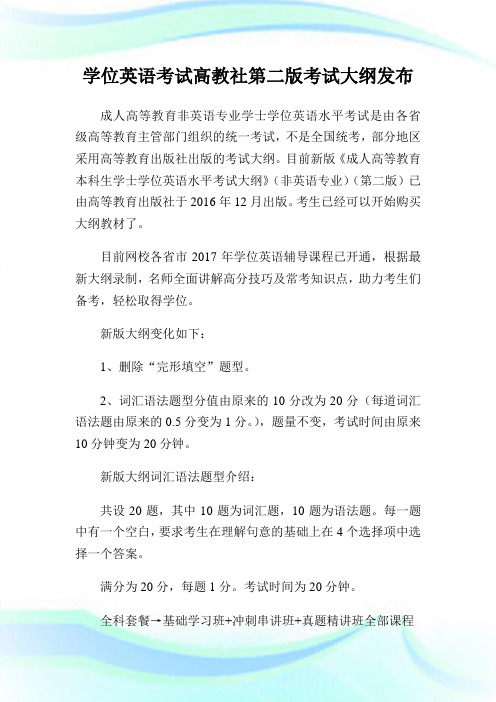
学位英语考试高教社第二版考试大纲发布
成人高等教育非英语专业学士学位英语水平考试是由各省级高等教育主管部门组织的统一考试,不是全国统考,部分地区采用高等教育出版社出版的考试大纲。
目前新版《成人高等教育本科生学士学位英语水平考试大纲》(非英语专业)(第二版)已由高等教育出版社于2016年12月出版。
考生已经可以开始购买大纲教材了。
目前网校各省市2017年学位英语辅导课程已开通,根据最新大纲录制,名师全面讲解高分技巧及常考知识点,助力考生们备考,轻松取得学位。
新版大纲变化如下:
1、删除“完形填空”题型。
2、词汇语法题型分值由原来的10分改为20分(每道词汇语法题由原来的0.5分变为1分。
),题量不变,考试时间由原来10分钟变为20分钟。
新版大纲词汇语法题型介绍:
共设20题,其中10题为词汇题,10题为语法题。
每一题中有一个空白,要求考生在理解句意的基础上在4个选择项中选择一个答案。
满分为20分,每题1分。
考试时间为20分钟。
全科套餐→基础学习班+冲刺串讲班+真题精讲班全部课程
经典班次科学搭配,重点、难点、考点一网打尽。
全方位教学服务高效备考,助您通过考试。
各地课程均含“基础学习班”和“冲刺串讲班”,部分地区另含“真题精讲班”、“习题精讲班”。
实验班→高清交互课件,贴心助教。
签署协议,考试不过,返学费
享受套餐全部课程及服务,专职助教督促,个性辅导全程跟踪。
当期考试未过,按协议返还学费!。
《成人高等教育本科生学士学位英语水平考试大纲(非英语专业)》
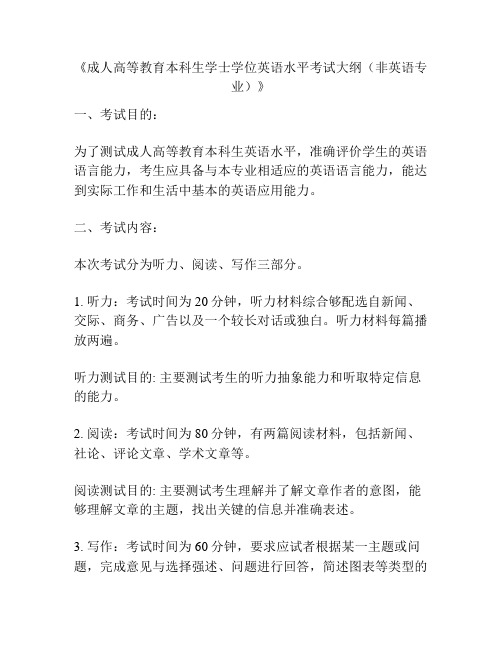
《成人高等教育本科生学士学位英语水平考试大纲(非英语专业)》一、考试目的:为了测试成人高等教育本科生英语水平,准确评价学生的英语语言能力,考生应具备与本专业相适应的英语语言能力,能达到实际工作和生活中基本的英语应用能力。
二、考试内容:本次考试分为听力、阅读、写作三部分。
1. 听力:考试时间为20分钟,听力材料综合够配选自新闻、交际、商务、广告以及一个较长对话或独白。
听力材料每篇播放两遍。
听力测试目的: 主要测试考生的听力抽象能力和听取特定信息的能力。
2. 阅读:考试时间为80分钟,有两篇阅读材料,包括新闻、社论、评论文章、学术文章等。
阅读测试目的: 主要测试考生理解并了解文章作者的意图,能够理解文章的主题,找出关键的信息并准确表述。
3. 写作:考试时间为60分钟,要求应试者根据某一主题或问题,完成意见与选择强述、问题进行回答,简述图表等类型的英语写作任务。
写作测试目的: 主要测试考试者的英语表达能力和书写能力,要求考生可以准确的表达自己的观点。
三、考试方法:本次考试采取中英文、笔试形式,考生需在规定时间内完成考试。
1. 听力:听力测试材料每篇播放两遍,考生听取材料后完成听力测试。
2. 阅读:考试时间内考生阅读材料,根据材料完成阅读测试。
3. 写作:考试时间内根据考试要求完成写作测试。
四、考试评分:考试采用客观评分和主观评分相结合的方式。
听力和阅读部分根据考生答题情况,按照一定的标准进行评分;写作部分主要通过评阅考生完整的英文短文,进行评分。
考试总分为100分。
具体评分标准详见考试评分标准。
五、容错机制:为保证考生的合法权益,考试中设有一定的容错机制,具体内容详见《容错机制》文件。
六、作弊及其他不正当行为的惩罚:为维护考试的公平性,对于有作弊及其他不正当行为的考生,将根据《规定与惩罚》进行严格的处罚。
全国通用高教社版2023成人高等教育本科生学士学位英语水平考试大纲
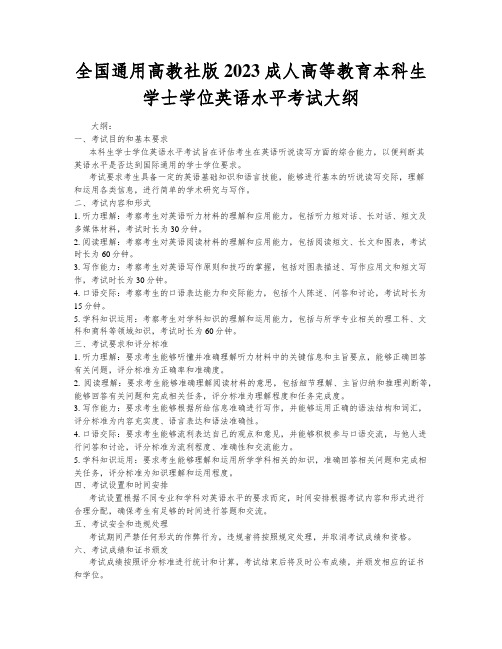
全国通用高教社版2023成人高等教育本科生学士学位英语水平考试大纲大纲:一、考试目的和基本要求本科生学士学位英语水平考试旨在评估考生在英语听说读写方面的综合能力,以便判断其英语水平是否达到国际通用的学士学位要求。
考试要求考生具备一定的英语基础知识和语言技能,能够进行基本的听说读写交际,理解和运用各类信息,进行简单的学术研究与写作。
二、考试内容和形式1. 听力理解:考察考生对英语听力材料的理解和应用能力,包括听力短对话、长对话、短文及多媒体材料,考试时长为30分钟。
2. 阅读理解:考察考生对英语阅读材料的理解和应用能力,包括阅读短文、长文和图表,考试时长为60分钟。
3. 写作能力:考察考生对英语写作原则和技巧的掌握,包括对图表描述、写作应用文和短文写作,考试时长为30分钟。
4. 口语交际:考察考生的口语表达能力和交际能力,包括个人陈述、问答和讨论,考试时长为15分钟。
5. 学科知识运用:考察考生对学科知识的理解和运用能力,包括与所学专业相关的理工科、文科和商科等领域知识,考试时长为60分钟。
三、考试要求和评分标准1. 听力理解:要求考生能够听懂并准确理解听力材料中的关键信息和主旨要点,能够正确回答有关问题,评分标准为正确率和准确度。
2. 阅读理解:要求考生能够准确理解阅读材料的意思,包括细节理解、主旨归纳和推理判断等,能够回答有关问题和完成相关任务,评分标准为理解程度和任务完成度。
3. 写作能力:要求考生能够根据所给信息准确进行写作,并能够运用正确的语法结构和词汇,评分标准为内容充实度、语言表达和语法准确性。
4. 口语交际:要求考生能够流利表达自己的观点和意见,并能够积极参与口语交流,与他人进行问答和讨论,评分标准为流利程度、准确性和交流能力。
5. 学科知识运用:要求考生能够理解和运用所学学科相关的知识,准确回答相关问题和完成相关任务,评分标准为知识理解和运用程度。
四、考试设置和时间安排考试设置根据不同专业和学科对英语水平的要求而定,时间安排根据考试内容和形式进行合理分配,确保考生有足够的时间进行答题和交流。
成人高等教育本科生学士学位英语水平考试大纲非英语专业
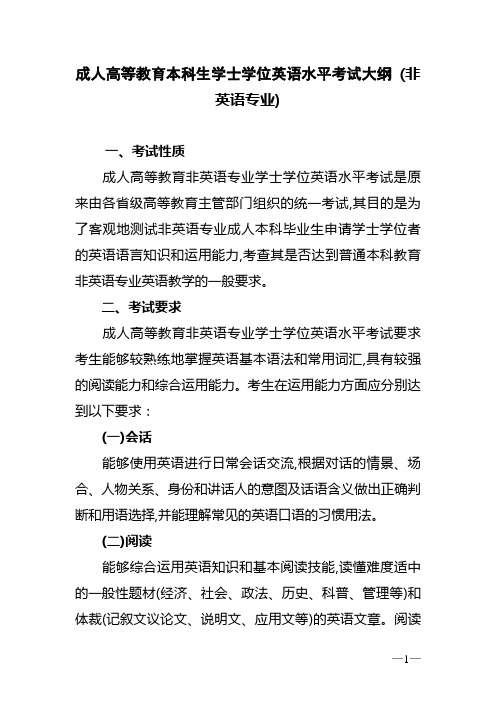
成人高等教育本科生学士学位英语水平考试大纲(非英语专业)一、考试性质成人高等教育非英语专业学士学位英语水平考试是原来由各省级高等教育主管部门组织的统一考试,其目的是为了客观地测试非英语专业成人本科毕业生申请学士学位者的英语语言知识和运用能力,考查其是否达到普通本科教育非英语专业英语教学的一般要求。
二、考试要求成人高等教育非英语专业学士学位英语水平考试要求考生能够较熟练地掌握英语基本语法和常用词汇,具有较强的阅读能力和综合运用能力。
考生在运用能力方面应分别达到以下要求:(一)会话能够使用英语进行日常会话交流,根据对话的情景、场合、人物关系、身份和讲话人的意图及话语含义做出正确判断和用语选择,并能理解常见的英语口语的习惯用法。
(二)阅读能够综合运用英语知识和基本阅读技能,读懂难度适中的一般性题材(经济、社会、政法、历史、科普、管理等)和体裁(记叙文议论文、说明文、应用文等)的英语文章。
阅读速度达到每分钟80个词。
具体要求为:1.能够掌握文章的中心思想、主要内容和细节;2.具备根据上下文把握词义的能力,理解上下文的逻辑关系;3.能够根据所读材料进行一定的推论;4.能够对文章的结构和作者的态度等做出一般的分析和判断。
(三)词汇掌握本考试大纲所规定的英语词汇、常用词组、常用词缀,并在阅读、写作等过程中具有相应的应用能力,即:1.领会式掌握4000个单词和500个常用词组;2.复用式掌握1800个左右的常用单词和搭配以及150个左右的常用词组;3.掌握一定数量的常用词缀,并能根据构词法和语境识别常见的派生词。
(四)语法掌握基本的英语语法知识,要求能在阅读、写作等过程中正确运用这些知识,达到正确理解、获取信息及表达思想的目的。
需要掌握的具体内容如下:1.名词、代词的数和格的构成及其用法;2.动词的基本时态、语态的构成及其用法;3.形容词、副词的比较级和最高级的构成及其用法;4.常用连接词、冠词的词义及其用法;5.非谓语动词(不定式、动名词、分词)的构成及其用法;6.虚拟语气的构成及其用法;7.各类从句的构成及其用法;8.基本句型的结构及其用法;9.强调句型的结构及其用法;10.常用倒装句的结构及其用法。
成人高等教育本科生学士学位英语水平考试大纲(非英语专业第二版)
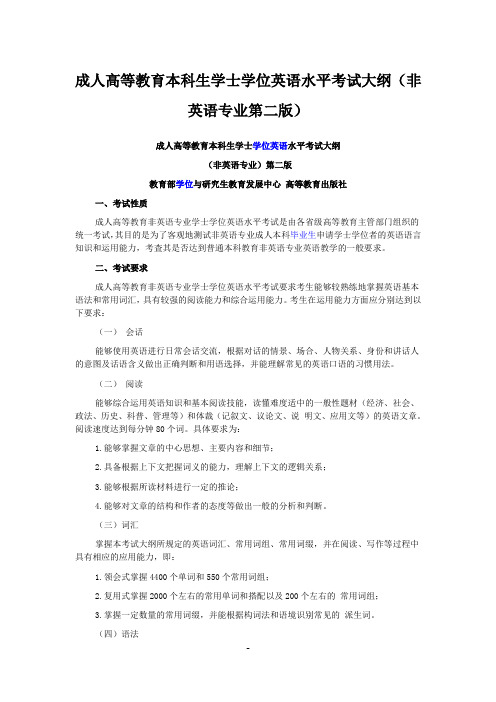
成人高等教育本科生学士学位英语水平考试大纲(非英语专业第二版)成人高等教育本科生学士学位英语水平考试大纲(非英语专业)第二版教育部学位与研究生教育发展中心高等教育出版社一、考试性质成人高等教育非英语专业学士学位英语水平考试是由各省级高等教育主管部门组织的统一考试,其目的是为了客观地测试非英语专业成人本科毕业生申请学士学位者的英语语言知识和运用能力,考査其是否达到普通本科教育非英语专业英语教学的一般要求。
二、考试要求成人高等教育非英语专业学士学位英语水平考试要求考生能够较熟练地掌握英语基本语法和常用词汇,具有较强的阅读能力和综合运用能力。
考生在运用能力方面应分别达到以下要求:(一)会话能够使用英语进行日常会话交流,根据对话的情景、场合、人物关系、身份和讲话人的意图及话语含义做出正确判断和用语选择,并能理解常见的英语口语的习惯用法。
(二)阅读能够综合运用英语知识和基本阅读技能,读懂难度适中的一般性题材(经济、社会、政法、历史、科普、管理等)和体裁(记叙文、议论文、说明文、应用文等)的英语文章。
阅读速度达到每分钟80个词。
具体要求为:1.能够掌握文章的中心思想、主要内容和细节;2.具备根据上下文把握词义的能力,理解上下文的逻辑关系;3.能够根据所读材料进行一定的推论;4.能够对文章的结构和作者的态度等做出一般的分析和判断。
(三)词汇掌握本考试大纲所规定的英语词汇、常用词组、常用词缀,并在阅读、写作等过程中具有相应的应用能力,即:1.领会式掌握4400个单词和550个常用词组;2.复用式掌握2000个左右的常用单词和搭配以及200个左右的常用词组;3.掌握一定数量的常用词缀,并能根据构词法和语境识别常见的派生词。
(四)语法掌握基本的英语语法知识,要求能在阅读、写作等过程中正确运用这些知识,达到正确理解、获取信息及表达思想的目的。
需要掌握的具体内容如下:1.名词、代词的数和格的构成及其用法;2.动词的基本时态、语态的构成及其用法;3.形容词、副词的比较级和最高级的构成及其用法;4.常用连接词、冠词的词义及其用法;5.非谓语动词(不定式、动名词、分词)的构成及其用法;6.虚拟语气的构成及其用法;7.各类从句的构成及其用法;8.基本句型的结构及其用法;9.强调句型的结构及其用法;10.常用倒装句的结构及其用法。
学位英语考试大纲
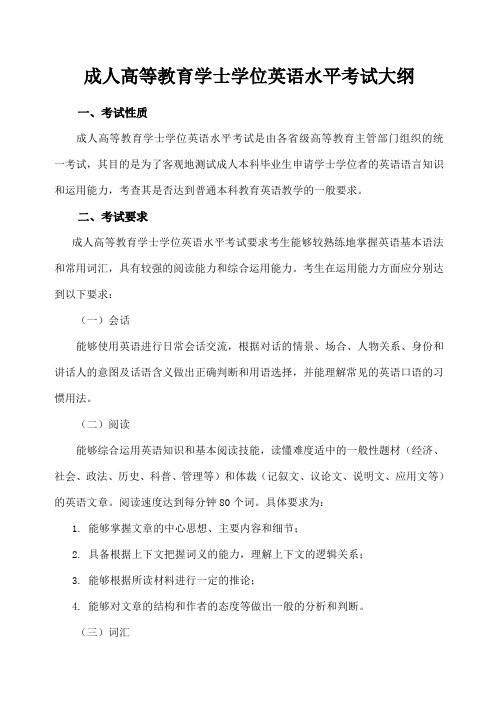
成人高等教育学士学位英语水平考试大纲一、考试性质成人高等教育学士学位英语水平考试是由各省级高等教育主管部门组织的统一考试,其目的是为了客观地测试成人本科毕业生申请学士学位者的英语语言知识和运用能力,考查其是否达到普通本科教育英语教学的一般要求。
二、考试要求成人高等教育学士学位英语水平考试要求考生能够较熟练地掌握英语基本语法和常用词汇,具有较强的阅读能力和综合运用能力。
考生在运用能力方面应分别达到以下要求:(一)会话能够使用英语进行日常会话交流,根据对话的情景、场合、人物关系、身份和讲话人的意图及话语含义做出正确判断和用语选择,并能理解常见的英语口语的习惯用法。
(二)阅读能够综合运用英语知识和基本阅读技能,读懂难度适中的一般性题材(经济、社会、政法、历史、科普、管理等)和体裁(记叙文、议论文、说明文、应用文等)的英语文章。
阅读速度达到每分钟80个词。
具体要求为:1. 能够掌握文章的中心思想、主要内容和细节;2. 具备根据上下文把握词义的能力,理解上下文的逻辑关系;3. 能够根据所读材料进行一定的推论;4. 能够对文章的结构和作者的态度等做出一般的分析和判断。
(三)词汇掌握本考试大纲所规定的英语词汇、常用词组、常用词缀,并在阅读、写作等过程中具有相应的应用能力,即:1. 领会式掌握4500个单词和500个常用词组;2. 复用式掌握2000个左右的常用单词和搭配以及200个左右的常用词组;3. 掌握一定数量的常用词缀,并能根据构词法和语境识别常见的派生词。
(四)语法掌握基本的英语语法知识,要求能在阅读、写作等过程中正确运用这些知识,达到正确理解、获取信息及表达思想的目的。
需要掌握的具体内容如下:1. 名词、代词的数和格的构成及其用法;2. 动词的基本时态、语态的构成及其用法;3. 形容词、副词的比较级和最高级的构成及其用法;4. 常用连接词、冠词的词义及其用法;5. 非谓语动词(不定式、动名词、分词)的构成及其用法;6. 虚拟语气的构成及其用法;7. 各类从句的构成及其用法;8. 基本句型的结构及其用法;9. 强调句型的结构及其用法;10. 常用倒装句的结构及其用法。
成人高等教育本科生学士学位英语水平考试大纲

成人高等教育本科生学士学位英语水平考试大纲标题:成人高等教育本科生学士学位英语水平考试大纲成人高等教育本科生学士学位英语水平考试(以下简称英语考试)是为提高成人本科生英语水平,促进其终身学习和终身发展而设置的考试。
英语考试的主要目的是测试考生的英语综合运用能力,包括听力、口语、阅读和写作技能。
一、考试内容1. 听力:考生需理解基础对话和文章内容,包括日常生活对话、新闻报道等,考查考生听力理解和应对能力。
2. 口语:考生需要通过独自展示或小组讨论等形式,进行口语交流,表达观点、陈述论据等,考查考生口语表达和沟通能力。
3. 阅读:要求考生阅读各类文体文章,包括新闻报道、学术论文等,考查考生阅读理解和综合分析能力。
4. 写作:考生需完成短文写作、文章写作等任务,表达清晰的思想和观点,考查考生的写作能力和逻辑思维能力。
二、考试形式英语考试采用计算机化考试形式,包括听力测试、口语测试、阅读测试和写作测试,考试环节依次进行,每个环节根据不同的题型和要求设计相应的考试内容,以全面评价考生的英语水平。
1. 听力测试:通过播放录音材料,要求考生听懂并回答问题,考查考生对英语语音、语调的理解和应用能力。
2. 口语测试:考生通过录音方式进行口语表达,如自我介绍、描述事物等,考查考生的口语表达和交流能力。
3. 阅读测试:考生阅读文章并回答问题,展示对文章内容的理解和分析能力,同时包括词汇搭配、语法运用等方面的考察。
4. 写作测试:考生根据题目要求进行写作,包括画面作文、议论文等,考察考生的写作逻辑性、表达能力和语法正确性。
三、考试要求英语考试要求考生全面掌握英语基础知识,具备较强的听说读写能力,能够熟练运用英语进行日常交流和学术表达。
考试不仅考察考生的语言基础,更注重考生的实际运用能力和思维深度。
1. 听力能力:考生需要具备听懂并理解英语对话、演讲等能力,能够准确把握信息并做出反应。
2. 口语能力:要求考生具备流利表达思想、交流观点的口语能力,能够清晰表达观点并与他人进行有效沟通。
成人高等教育本科生学士学位英语水平考试大纲
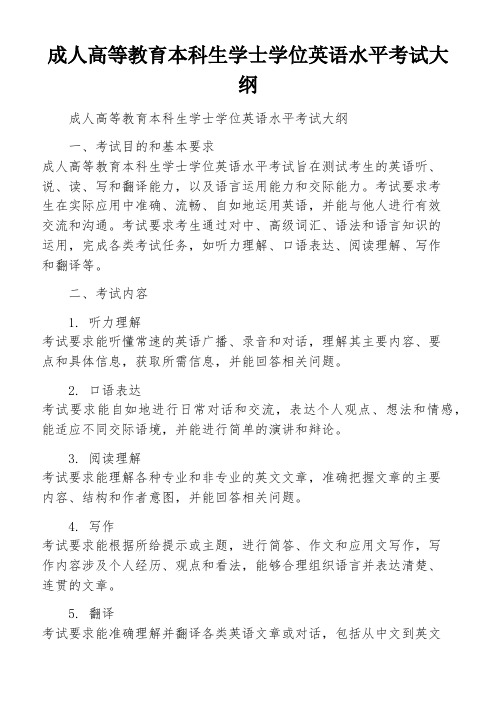
成人高等教育本科生学士学位英语水平考试大纲成人高等教育本科生学士学位英语水平考试大纲一、考试目的和基本要求成人高等教育本科生学士学位英语水平考试旨在测试考生的英语听、说、读、写和翻译能力,以及语言运用能力和交际能力。
考试要求考生在实际应用中准确、流畅、自如地运用英语,并能与他人进行有效交流和沟通。
考试要求考生通过对中、高级词汇、语法和语言知识的运用,完成各类考试任务,如听力理解、口语表达、阅读理解、写作和翻译等。
二、考试内容1. 听力理解考试要求能听懂常速的英语广播、录音和对话,理解其主要内容、要点和具体信息,获取所需信息,并能回答相关问题。
2. 口语表达考试要求能自如地进行日常对话和交流,表达个人观点、想法和情感,能适应不同交际语境,并能进行简单的演讲和辩论。
3. 阅读理解考试要求能理解各种专业和非专业的英文文章,准确把握文章的主要内容、结构和作者意图,并能回答相关问题。
4. 写作考试要求能根据所给提示或主题,进行简答、作文和应用文写作,写作内容涉及个人经历、观点和看法,能够合理组织语言并表达清楚、连贯的文章。
5. 翻译考试要求能准确理解并翻译各类英语文章或对话,包括从中文到英文和从英文到中文的翻译。
翻译内容涉及日常生活、教育、科技、文化等各类话题。
三、考试形式和时间安排考试形式为笔试,分为听力理解、口语表达、阅读理解、写作和翻译五个部分。
总考试时间约为150分钟。
1. 听力理解:约25分钟,包含听力材料和问题,考生需听力理解并回答问题。
2. 口语表达:约12分钟,分为个人发言和提问两个环节,考生需进行个人陈述并回答相关问题。
3. 阅读理解:约55分钟,包含多篇文章和相关问题,考生需阅读并回答问题。
4. 写作:约30分钟,包含简答题、作文题和应用文题,考生需完成写作任务。
5. 翻译:约28分钟,包含中译英和英译中两个部分,考生需完成翻译任务。
四、考试评分标准考试总分为100分,各个部分的总分比例为听力理解(20%)、口语表达(15%)、阅读理解(25%)、写作(25%)和翻译(15%)。
《成人高等教育本科生学士学位英语水平考试大纲(非英语专业)》(2016年12月第二版)
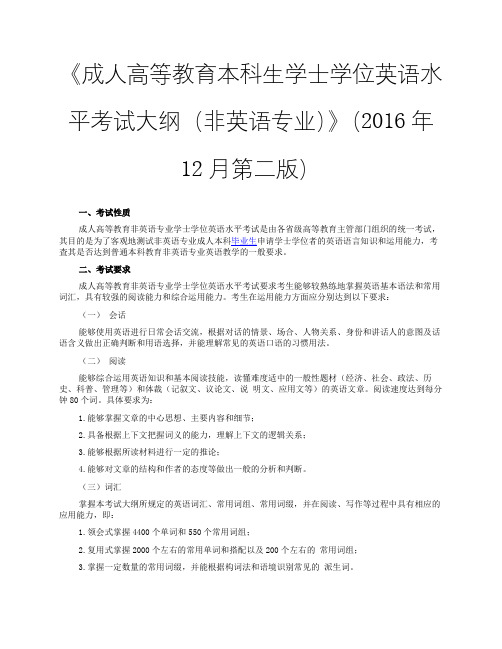
《成人高等教育本科生学士学位英语水平考试大纲(非英语专业)》(2016年12月第二版)一、考试性质成人高等教育非英语专业学士学位英语水平考试是由各省级高等教育主管部门组织的统一考试,其目的是为了客观地测试非英语专业成人本科毕业生申请学士学位者的英语语言知识和运用能力,考査其是否达到普通本科教育非英语专业英语教学的一般要求。
二、考试要求成人高等教育非英语专业学士学位英语水平考试要求考生能够较熟练地掌握英语基本语法和常用词汇,具有较强的阅读能力和综合运用能力。
考生在运用能力方面应分别达到以下要求:(一)会话能够使用英语进行日常会话交流,根据对话的情景、场合、人物关系、身份和讲话人的意图及话语含义做出正确判断和用语选择,并能理解常见的英语口语的习惯用法。
(二)阅读能够综合运用英语知识和基本阅读技能,读懂难度适中的一般性题材(经济、社会、政法、历史、科普、管理等)和体裁(记叙文、议论文、说明文、应用文等)的英语文章。
阅读速度达到每分钟80个词。
具体要求为:1.能够掌握文章的中心思想、主要内容和细节;2.具备根据上下文把握词义的能力,理解上下文的逻辑关系;3.能够根据所读材料进行一定的推论;4.能够对文章的结构和作者的态度等做出一般的分析和判断。
(三)词汇掌握本考试大纲所规定的英语词汇、常用词组、常用词缀,并在阅读、写作等过程中具有相应的应用能力,即:1.领会式掌握4400个单词和550个常用词组;2.复用式掌握2000个左右的常用单词和搭配以及200个左右的常用词组;3.掌握一定数量的常用词缀,并能根据构词法和语境识别常见的派生词。
(四)语法掌握基本的英语语法知识,要求能在阅读、写作等过程中正确运用这些知识,达到正确理解、获取信息及表达思想的目的。
需要掌握的具体内容如下:1.名词、代词的数和格的构成及其用法;2.动词的基本时态、语态的构成及其用法;3.形容词、副词的比较级和最高级的构成及其用法;4.常用连接词、冠词的词义及其用法;5.非谓语动词(不定式、动名词、分词)的构成及其用法;6.虚拟语气的构成及其用法;7.各类从句的构成及其用法;8.基本句型的结构及其用法;9.强调句型的结构及其用法;10.常用倒装句的结构及其用法。
成考学士学位英语教学大纲(最新完整版)
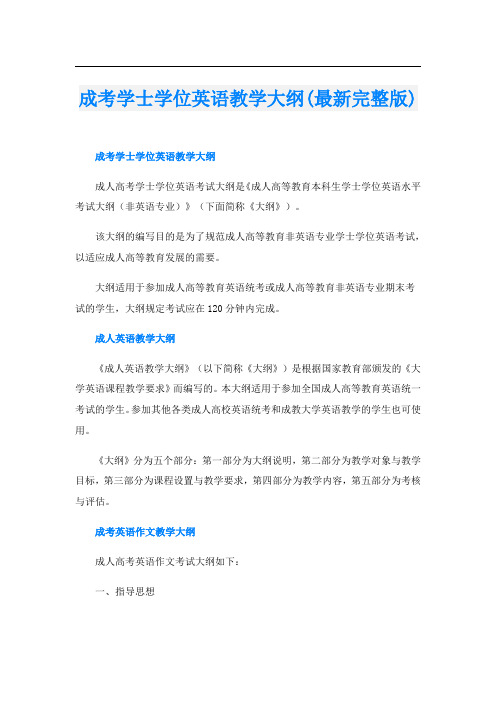
成考学士学位英语教学大纲(最新完整版)成考学士学位英语教学大纲成人高考学士学位英语考试大纲是《成人高等教育本科生学士学位英语水平考试大纲(非英语专业)》(下面简称《大纲》)。
该大纲的编写目的是为了规范成人高等教育非英语专业学士学位英语考试,以适应成人高等教育发展的需要。
大纲适用于参加成人高等教育英语统考或成人高等教育非英语专业期末考试的学生,大纲规定考试应在120分钟内完成。
成人英语教学大纲《成人英语教学大纲》(以下简称《大纲》)是根据国家教育部颁发的《大学英语课程教学要求》而编写的。
本大纲适用于参加全国成人高等教育英语统一考试的学生。
参加其他各类成人高校英语统考和成教大学英语教学的学生也可使用。
《大纲》分为五个部分:第一部分为大纲说明,第二部分为教学对象与教学目标,第三部分为课程设置与教学要求,第四部分为教学内容,第五部分为考核与评估。
成考英语作文教学大纲成人高考英语作文考试大纲如下:一、指导思想英语写作能考查学生的语言组织能力,表达能力和对不同文体语篇的熟悉度。
从实用的角度出发,写作是信息的交流,思想的表达。
通过英语写作,可以提高学生对语言规律的认识和应用语言的熟练程度,从而提高英语语言的应用能力。
二、命题思路1.命题以《考试大纲》为依据,以考试说明为准绳,从有利于考查考生的基本英语水平出发,结合教学实际,突出英语基础知识,强调运用能力。
2.考试以客观题为主,兼有主观题。
3.试卷分为容易题、中等难度题和难度的题。
重点考查容易题。
4.难度适中,体现选拔性。
试卷总题量为100道。
5.全部用涂卡方式答题。
6.全部用英文作答。
三、考试内容及要求第一部分英语知识运用主要考查考生对英语知识的全面掌握情况,包括对词汇、语法和语篇的熟悉程度。
本部分要求考生具备扎实的英语基本功,能运用所学知识正确地表达思想。
试题的特点是知识覆盖面广,考点多,情景真实,语言规范,测试要点突出。
要求考生具有较敏锐的语感及丰富的词汇、语法知识,并能在特定的情景下灵活运用所学的词汇和句型。
成人高等教育本科毕业生学士学位英语考试(样题)

成人高等教育本科毕业生学士学位英语考试(样题)(非英语专业)(考试形式:闭卷,考试用时:120分钟)注意事项一、请务必工整清晰地将自己的校名、姓名、准考证号等考生信息写在答题纸密封线内的指定位置。
二、多项选择题只能选一个答案,多选以答错处理。
所有答案一定要写在答题纸上,凡是写在试题册上的答案一律无效。
三、在120分钟内答完所有试题,不得拖延时间。
考试结束后,考生将试题册和答题纸放置桌上,均不得带走。
待监考老师收卷,清点无误后方可离开考场。
Part I Grammar and Vocabulary (20%, 20 minutes)Directions: There are 30 incomplete sentences in this part. Foreach sentence there are four choices marked A). B). C) and D). Choosethe ONE answer that best completes the sentence. Then mark the corresponding letter on the Answer Sheet witha single line through the center.1. I ________ a long pole in the centre of the field, and on top of it I hung the lamp.A) put up B) put on C) put out D) put up with2. We all ________ the achievements he has made in his experiments.A) admire B) advise C) adopt D) adjust3. If the test taker finds an item to which an answer is not known, it may be ________to leave it blank and go on with the test.A) valuable B) advisable C) considerable D) probable4. Though the long term ________cannot be predicted, the project has been approved by the committee.A) affect B) effort C) effect D) afford5. The teacher‘s lecture on American history was three hours long, and Morris felt very ________.A) hurt B) bored C) disturbed D) neglected6. It‘s surprising that this innocent-looking person should have ________such a crime.1A) performed B) acted C) made D) committed7. Ted agreed to ________the strike if the company would satisfy the demand if the workers.A) call out B) call off C) call to D) call on8. Not long ago, John Smith, whom you know very well, was ________a car accident.A) related to B) involved inC) included in D) damaged by9. All particulars should be carefully checked. Nothing shouldbe________.A) born in mind B) put up withC) taken for granted D) taken into consideration10. We‘ve been ________ with that company for many years.A) comparing B) dealing C) keeping D) combining11. This multiple-choice test ________40 incomplete statements with several choices to complete them.A) is composed of B) consists inC) makes up D) sets out12. In the theatre the actors are very ________to the reaction of the audience.A) sensible B) sensitiveC) emotional D) positive13. He wore dark glasses to avoid ________.A) having been recognized B) to be recognizedC) recognized D) being recognized14. It ________around nine o‘clock when I drove back home because it was already dark.A) had to be B) must have beenC) was to be D) must be15. There was a teapot fashioned like a duck, out of ________ open mouth the tea was supposed to come.A) which B) its C) that D) whose16. ________ being used in industry, laser can be applied to operations in the hospital.A) Except for B) In addition toC) Out of D) In spite of17. ________ on a clear day, far from the city crowds, the mountains give him a sense of infinite peace.A) If walking B) WalkingC) While walking D) When one is walking18. The Vikings are believed ________America.A) to have discovered B) to discoverC) in discovering D) to have been discovered19. Husband and wife with a common duty to the country will find themselves ________closer together.A) been drawn B) to draw C) drawn D) drawing20. Prisons in some countries are short of staff, _______means each prison officer is overworked and underpaid.A) which B) this C) what D) itPart II Reading Comprehension (20%, 30 minutes)Directions: There are 4 reading passages in this part. Each passage is followed by some questions or unfinished statements. For each of them there are four choices marked A), B), C) and D). You should decide on the choice that best answers the question or completes the statement. Then mark the corresponding letter on the Answer Sheet with a singleline through the center.Questions 21 to 25 are based on the following passage:Versailles is the site of the Palace of Versailles, one of the most storied buildings in the history of France. It was originally built as a hunting chateau by King Louis VIII in 1624. In 1669, King Louis XIV began searching for a grand site where he could conduct the affairs of France and control the government. He settled on the hunting palace and expanded it into the world‘s largest palace. In addit ion, the King hoped to build a governmental center apart from Paris.The palace took 36,000 workers fifty years to build. The palace is spread out over 280 acres and can house 20,000 people! The palace features over 700 rooms and 67 staircases. There are dozens of unique rooms, features, gardens, and halls. One ofthe most renowned rooms of the Palace of Versailles is the Hall of Mirrors. Recently restored, the Hall of Mirrors is the centerpiece of the dazzling building. Originally added to the palace in 1684, the Hall of Mirrors was built to be a dazzling display of the power and wealth of the French Monarchy. The hall, which measures 73 meters in length features 357 gold-coated stucco mirrors, ornate paintings, crystal chandeliers, marble fixtures, a parquet floor, and ceilings withcolorful murals painted by artist Charles Le Brun. The Hall of Mirrors has also played a prominent role in history. Both the proclamation of the German Empire in 1871 after the Franco-Prussian War and the signing of the Treaty of Versailles that formally ended World War One were signed here.21. When was the Palace of Versailles originally built?A. In 1684.B. In 1624.C. In 1669.D. In 1786.22. Why did King Louis XIV want a grand palace?A. So he and his queen could retire comfortably.B. As a hunting chateau.C. As a place to conduct his nation's business.D. He wanted to impress his wife.23. Which of the following is NOT true?A. The Hall of Mirrors has been recently restored.B. The Hall of Mirrors is considered the centerpiece of the Palace of Versailles.C. The Hall of Mirrors features a parquet floor.D. Two major treaties were signed in the Hall of Mirrors.24. Which of the following is not mentioned as a feature of the Hall of Mirrors?A. Bronze moldings.B. Ornate paintings.C. Marble fixtures.D. Crystal chandeliers.25. Which of the following could be an appropriate title for this passage?A. Louis XIV and the Palace of Versailles.B. The ceilings of the Hall of Mirrors.C. The Amazing Palace of Versailles.D. A History of France.Questions 26 to 30 are based on the following passage :“It hurts me more than you,‖ and ―This is for your own good.‖ These are the statements my mother used to make years ago when I had to learn Latin, clean my room, stay home and do homework.That was before we entered the permissive period in education in which we decided it was all right not to push our children to achieve their best in school. The schools and the educators made it easy on us. They taught that it was all right to be parents who take a let-alone policy. We stopped making our children do homework. We gave them calculators, turned on the television, left the teaching to the teachers and went on vacation.Now teachers, faced with children who have been developing at their own pace for the past 15 years, are realizing we‘ve made a terrible mistake. One such teacher is Sharon Klompus who says of her students of them, she believes. Television, says Klompus, co ntributes to children‘s passivity. ―We‘re not tra ining kids to work any more,‖ says Klompus. ―We‘re talking about a generation of kids who‘ve never been hurt or hungry. They have learned somebody will always do it for them. Instead of saying ?go look it u p‘, you tell them the answer. It takes greater ene rgy to say no to a kid.‖Yes, it does. It takes energy and it takes work. It‘s time for parents to end their vacation and come back to work. It‘s time to take the car away, to turn the TV off, to tell them it hurts you more than them but it‘s for their own good. It‘s time to start telling them no again.26. Children are becoming more inactive in study because ________.A) they watch TV too oftenB) they have done too much homeworkC) they have to fulfill too many dutiesD) teachers are too strict with them27. To such children as described in the passage ________.A) it is easier to say no than to say yesB) neither is easy – to say yes or to say noC) it is easier to say yes than to say no。
2024年成人学士学位英语考试大纲
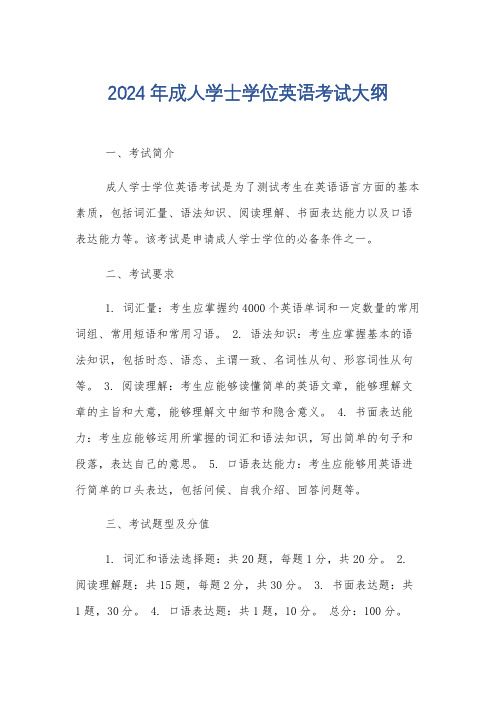
2024年成人学士学位英语考试大纲一、考试简介成人学士学位英语考试是为了测试考生在英语语言方面的基本素质,包括词汇量、语法知识、阅读理解、书面表达能力以及口语表达能力等。
该考试是申请成人学士学位的必备条件之一。
二、考试要求1. 词汇量:考生应掌握约4000个英语单词和一定数量的常用词组、常用短语和常用习语。
2. 语法知识:考生应掌握基本的语法知识,包括时态、语态、主谓一致、名词性从句、形容词性从句等。
3. 阅读理解:考生应能够读懂简单的英语文章,能够理解文章的主旨和大意,能够理解文中细节和隐含意义。
4. 书面表达能力:考生应能够运用所掌握的词汇和语法知识,写出简单的句子和段落,表达自己的意思。
5. 口语表达能力:考生应能够用英语进行简单的口头表达,包括问候、自我介绍、回答问题等。
三、考试题型及分值1. 词汇和语法选择题:共20题,每题1分,共20分。
2. 阅读理解题:共15题,每题2分,共30分。
3. 书面表达题:共1题,30分。
4. 口语表达题:共1题,10分。
总分:100分。
四、考试时间及地点考试时间:2024年xx月xx日9:00-11:00。
考试地点:具体地点将在报名时告知考生。
五、备考建议1. 制定合理的复习计划,按照考试要求进行词汇、语法、阅读、写作和口语等方面的复习。
2. 多做模拟试题,熟悉考试题型和解题技巧。
3. 注重基础知识的掌握和运用,尤其是词汇和语法知识。
4. 加强阅读和写作能力的训练,多读多写,提高自己的语言表达能力。
5. 积极参加口语练习,提高自己的口语表达能力。
以上是2024年成人学士学位英语考试大纲,希望对考生有所帮助。
考生应根据自己的实际情况,制定合理的复习计划,积极备考,争取取得好成绩。
(完整版)山东省成人高等教育学士学位英语考试大纲及样题
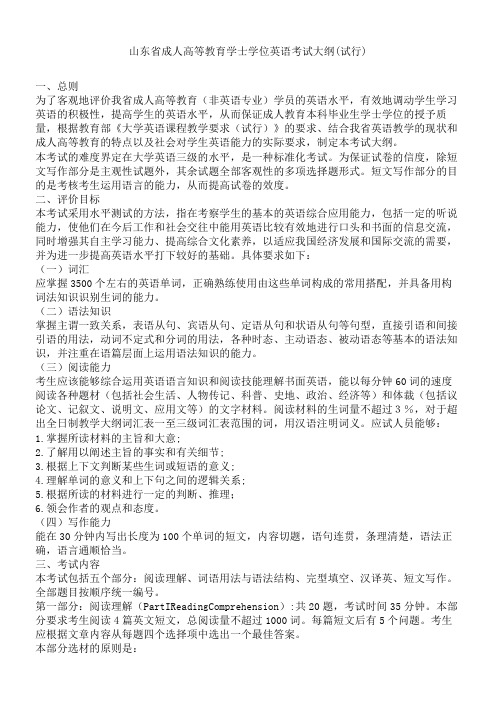
山东省成人高等教育学士学位英语考试大纲(试行)一、总则为了客观地评价我省成人高等教育(非英语专业)学员的英语水平,有效地调动学生学习英语的积极性,提高学生的英语水平,从而保证成人教育本科毕业生学士学位的授予质量,根据教育部《大学英语课程教学要求(试行)》的要求、结合我省英语教学的现状和成人高等教育的特点以及社会对学生英语能力的实际要求,制定本考试大纲。
本考试的难度界定在大学英语三级的水平,是一种标准化考试。
为保证试卷的信度,除短文写作部分是主观性试题外,其余试题全部客观性的多项选择题形式。
短文写作部分的目的是考核考生运用语言的能力,从而提高试卷的效度。
二、评价目标本考试采用水平测试的方法,指在考察学生的基本的英语综合应用能力,包括一定的听说能力,使他们在今后工作和社会交往中能用英语比较有效地进行口头和书面的信息交流,同时增强其自主学习能力、提高综合文化素养,以适应我国经济发展和国际交流的需要,并为进一步提高英语水平打下较好的基础。
具体要求如下:(一)词汇应掌握3500个左右的英语单词,正确熟练使用由这些单词构成的常用搭配,并具备用构词法知识识别生词的能力。
(二)语法知识掌握主谓一致关系,表语从句、宾语从句、定语从句和状语从句等句型,直接引语和间接引语的用法,动词不定式和分词的用法,各种时态、主动语态、被动语态等基本的语法知识,并注重在语篇层面上运用语法知识的能力。
(三)阅读能力考生应该能够综合运用英语语言知识和阅读技能理解书面英语,能以每分钟60词的速度阅读各种题材(包括社会生活、人物传记、科普、史地、政治、经济等)和体裁(包括议论文、记叙文、说明文、应用文等)的文字材料。
阅读材料的生词量不超过3%,对于超出全日制教学大纲词汇表一至三级词汇表范围的词,用汉语注明词义。
应试人员能够:1.掌握所读材料的主旨和大意;2.了解用以阐述主旨的事实和有关细节;3.根据上下文判断某些生词或短语的意义;4.理解单词的意义和上下句之间的逻辑关系;5.根据所读的材料进行一定的判断、推理;6.领会作者的观点和态度。
成人高等教育学士学位英语水平考试大纲 (非英语专业)

成人高等教育学士学位英语水平考试大纲(非英语专业)成人高等教育学士学位英语水平考试大纲 (非英语专业)是经国家教育部批准,由国家语言文字工作委员会制定的英语水平考试标准。
该考试旨在测试非英语专业学生的英语能力,包括听、说、读、写四项。
下面将分步骤阐述该考试大纲。
第一步,听力考试。
考生需要在规定时间内听一个录音,并回答相关问题。
这部分考试主要测试考生的听力理解和回答问题的能力。
考试时间为30分钟,共30个题目,分为短对话、长对话和短文三部分。
难度递增,需要考生掌握听懂不同语速、口音的英语和识别不同对话和文章的主题。
第二步,口语考试。
用时约为20分钟,考生需要回答一系列问题或完成一个或多个任务。
这部分测试考生的口语表达能力和沟通能力。
问题的难度逐渐增加,需要考生用适当的语言表达观点,回答问题并与考官进行互动。
第三步,阅读考试。
用时60分钟,共三篇文章,每篇文章后跟有若干个问题。
这部分测试考生的阅读理解能力和分析能力。
文章内容涉及到各种不同的主题和话题,需要考生能够理解并分析文章,并借助文章中的信息回答问题。
第四步,写作考试。
用时60分钟,需考生根据所给的话题以400-450个单词的篇幅撰写一篇文章。
这部分测试考生的写作和表达能力。
话题一般涉及到社会问题、文化、科技等,需要考生能够对话题进行深入探讨,并运用与之相关的词汇和语法建立正确、清晰的句子结构。
在学习备考过程中,考生需要全面严格地学习英语语法、词汇、听力、口语、阅读、写作等方面的知识,并结合真实的考试情境进行练习。
此外,考生还需要有正确的思路和方法,提高英语学习的效率。
正确认识和掌握考试的重点,能够很好的提高考试的分数。
总之,成人高等教育学士学位英语水平考试大纲 (非英语专业)是对考生英语水平的综合考查和测试,考生需要全面掌握英语学习的各方面知识,密切配合考试实际情况,全力备考,在考试中取得更好的成绩。
- 1、下载文档前请自行甄别文档内容的完整性,平台不提供额外的编辑、内容补充、找答案等附加服务。
- 2、"仅部分预览"的文档,不可在线预览部分如存在完整性等问题,可反馈申请退款(可完整预览的文档不适用该条件!)。
- 3、如文档侵犯您的权益,请联系客服反馈,我们会尽快为您处理(人工客服工作时间:9:00-18:30)。
成人高等教育学士学位英语水平考试大纲非英语专业说明文、应用文等)的英语文章。
阅读速度达到每分钟80个词。
具体要求为:1. 能够掌握文章的中心思想、主要内容和细节;2. 具备根据上下文把握词义的能力,理解上下文的逻辑关系;3. 能够根据所读材料进行一定的推论;4. 能够对文章的结构和作者的态度等做出一般的分析和判断。
(三)词汇掌握本考试大纲所规定的英语词汇、常用词组、常用词缀,并在阅读、写作等过程中具有相应的应用能力,即:1. 领会式掌握4500个单词和500个常用词组;2. 复用式掌握2000个左右的常用单词和搭配以及200个左右的常用词组;3. 掌握一定数量的常用词缀,并能根据构词法和语境识别常见的派生词。
(四)语法掌握基本的英语语法知识,要求能在阅读、写作等过程中正确运用这些知识,达到正确理解、获取信息及表达思想的目的。
需要掌握的具体内容如下:1. 名词、代词的数和格的构成及其用法;2. 动词的基本时态、语态的构成及其用法;3. 形容词、副词的比较级和最高级的构成及其用法;4. 常用连接词、冠词的词义及其用法;5. 非谓语动词(不定式、动名词、分词)的构成及其用法;6. 虚拟语气的构成及其用法;7. 各类从句的构成及其用法;8. 基本句型的结构及其用法;9. 强调句型的结构及其用法;10. 常用倒装句的结构及其用法。
(五)翻译能够在不借助词典的情况下把一般难度、非专业性题材的英文句子或短文译成汉语,译文通顺,用词基本正确,无重大语法错误。
英译汉的速度应达到每小时250词以上。
(六)写作能够用英语撰写常见应用文,或能够按照所给提纲、情景或图表,说明或论述一般性的话题。
所写短文要求主题明确,条理清楚,语言比较规范。
三、试卷结构本考试试卷分试卷一和试卷二。
试卷一为客观题,包括会话交际、阅读理解、词汇和语法、完形填空4个部分,考试时间为70分钟,满分为75分;试卷二为英译汉和短文写作,考试时间为50分钟,满分为25分。
试卷一和试卷二考试时间共计120分钟,总分为100分。
试卷各部分内容和结构如下:第一部分会话交际本部分包括两节,设以下两种题型,共10题。
A节为接续对话,共5题。
考生将在每一题上读到一段不完整的对话,及用以完成这段对话的4个选择项。
要求考生针对对话内容从4个选择项中选出一个最佳答案,使整个对话得以完成。
B节为对话理解,共5题。
考生将在每一题上读到一段对话和一个针对对话内容的问题,之后将读到用以回答问题的4个选择项。
要求考生从4个选择项中选出一个最佳答案。
本部分满分为10分,每题1分。
考试时间为10分钟。
第二部分阅读理解本部分共有4篇短文,总长度为1200词左右。
每篇文章后设5道题,共20题。
考生须在理解文章的基础上从为每个问题提供的4个选择项中选出一个最佳答案。
本部分满分为40分,每题2分。
考试时间为35分钟。
第三部分词汇和语法本部分共设20道题,其中10题为词汇题,10题为语法题。
每一题中有一个空白,要求考生在理解句意的基础上在4个选择项中选择一个最佳答案。
本部分满分为10分,每题0.5分。
考试时间为10分钟。
第四部分完形填空本部分是一篇200~300词左右的一般性短文,短文中设10个空白,每个空白为一道题。
考生须在理解短文意思的基础上从为每个空白提供的4个选择项中选出一个最佳答案,使短文的意思和结构恢复完整。
本部分满分为10分,每题1分。
考试时间为10分钟。
第五部分英译汉本部分可以是一篇长度为120个左右英文词的短文,要求考生翻译全文;也可以是一个较长的段落,要求考生翻译其中带有下画线的5个句子。
要求译文意思准确,文字通顺。
本部分满分为15分,考试时间为25分钟。
第六部分短文写作本部分可要求考生写一篇常见的应用文,也可用提纲、情景或图表做提示,要求考生说明或论述一个一般性话题,文章长度不低于100个英文词。
本部分满分为15分,考试时间为30分钟。
四、试卷题型、题量、记分及答题时间成人高等教育学士学位英语水平考试的题型、题量、记分及答题时间如下:序号题型题量记分时间(分钟)I 会话交10道10 10际II 阅读理20道40 35解III 词汇和20道10 10语法10道10 10 IV 完形填空V 英译汉1道15 25 VI 短文写1道15 30作总计62道100 120考试样卷Paper One 试卷一(65 minutes)Part I Dialogue Communication(10 minutes, 10 points)Section A Dialogue CompletionDirections: In this section, you will read 5 short incomplete dialogues between two speakers, each followed by four choices marked A, B, C, and D. Choose the answer that best suits the situation to complete the dialogue. Mark your answer on the ANSWER SHEETwith a single bar through the center of the letter that indicates your choice.1. Speaker A: Would you mind me sitting here?Speaker B: ________A. Yes, you may.B. Of course, go ahead.C. Well, you’d better not.D. I’m afraid not.2. Speaker A: Oh, John, nice to meet you here. How are you doing?Speaker B: ________A. Hi, I’m reading a newspaper.B. Not bad. How about you?C. Hi, how are you doing?D. Just so so, I’m afraid.3. Speaker A: You’re thinner than you once were, aren’t you?Speaker B: ________A. You bet I am.B. Mind your own business.C. It’s a pleasure of mine.D. I like to hear this.4. Speaker A: Bob, do you know you’ve got an A in the examination. Congratulations!Speaker B: ________A. Yes. It’s quite easy for me.B. It’s very kind of you to say so.C. Thank you for the good news.D. Not at all, it’s nothing.5. Speaker A: Well, it is time for boarding.Speaker B: ________A. Have a pleasant journey.B. Have a nice party.C.Nice to meet you.D. Hope you’ll feel better.Section B Dialogue ComprehensionDirections:In this section, you will read 5 short conversations. At the end of each conversation there is a question followed by 4 choices marked A, B, C, and D. Choose the best answer and mark your answer on the ANSWER SHEETwith a single bar through the center of the letter that indicates your choice.6. MAN: Is it OK if I drop in at the bank to get some cash?WOMAN: You’ll miss the train unless you hurry.QUESTION: What does the woman mean?A. The man shouldn’t drop in at the bank.B. The man won’t be able to get the cash.C. The man must be quick in order to catch the train.D. The man should take his timewaiting for the train.7. WOMAN: How is your Grandma now?MAN: We all think she should take it easy after her fall.QUESTION: What does the man mean?A. Grandma should be careful so as not to fall again.B. Grandma had a fall, but she is all right now.C. Grandma shouldn’t do so much work after her fall.D. Grandma shouldn’t be blamed for her fall.8. MAN: Would you like to have some ice-cream?WOMAN: I wish I could, but I just can’t. I’m on a diet.QUESTION: What do we learn about the woman?A. She is in a big hurry.B. She is trying to lose weight.C. She can’t eat anything at the moment.D. She never likes ice-cream.9. MAN: Do you think I should get this book on computers?WOMAN: Well, it seems way beyond you.QUESTION: What does the woman think about the book?A. It’s suitable for the man.B. It’s unnecessary for the man.C. It’s within the man’s reach.D. It’s too difficult for the man.10. WOMAN: The front door is not convenient for the disabled.MAN: The door for wheelchairs is in the rear.QUESTION: What does the man mean?A. Wheelchairs areprovided at the rear door.B. The front door is not for the disabled.C. The disabled could use the rear door.D. The rear door is as convenient as the front door.Part II Reading Comprehension (35 minutes, 40 points)Directions: There are 4 passages in this part. Each passage is followed by 5 questions or unfinished statements. For each of them there are 4 choices marked A, B, C and D. Choose the best one and mark your answer on the ANSWER SHEET with a single bar through the center of the letter that indicates your choice. Passage OneBook clubs are a great way to meet new friends or keep in touch with old ones, while keeping up on our reading and participating in lively and intellectually stimulating discussions. If you’re interested in starting a book club, you should consider the following options and recommendations.Before recruiting, think carefully about how many people you want to participate and also what the club’s focus will be. For example, some book clubs focus exclusively on fiction; others read nonfiction. Some are even more specific, focusing only on a particular type such as mysteries, science fiction, or romance. Others have a more flexible and open focus. All of these possibilities can make for a great club, but it is important to decide on a focus at the beginning so the guidelines will be clear to the group and potential member.After setting the basic principles, recruitment can begin. Notify friends and family, advertise in the local newspaperand on bulletin boards in local stores, colleges, libraries, and bookstores. When enough people express interest, schedule a kick-off meeting during which decisions will be made about specific guidelines that will ensure the club runs smoothly. This meeting will need to establish where the group will meet (rotating homes or a public place such as a library or coffee shop); how often the group will meet, and on what day of the week and at what time; how long the meetings will be; how books will be chosen and by whom; who will lead the group (if anyone); and whether snacks will be served and if so, who will supply them. By the end of this meeting, these guidelines should be set and a book selection and date for the first official meeting should be finalized.Planning and running a book club is not without challenges, but when a book club is run effectively, the experience can be extremely rewarding for everyone involved.11.When starting a book club, one should first.A.notify his friends and familyB.put an ad in a local newspaperC.decide on the focus and size of the clubD.consider when and where the group will meet12.According to Paragraph 2, the “focus” of a book club refe rs to.A.funds B.locationsC.book types D.members13.Which of the following would NOT be covered at the kick-off meeting?A.Deciding on whether snacks will be served.B.Discussing whether to appoint a leader.C.Determiningthe club’s first selection.D.Pla nning the club’s yearly budget.14.Which of the following can be learned from the passage?A.Starting a book club requires good planning.B.A book club is a place to make new friends.C.Starting one’s own book club is better than joining an existing one.D.Smaller groups are better for a variety of reasons.15.The best title for this passage could be“________”.A.Book Clubs: A Great Way to Meet Old FriendsB.Book Club Planning: A Great ChallengeC.Five Steps to Recruit Members for a Book ClubD.Starting a Successful Book Club: A GuidePassage TwoThe Mayan (玛雅) Indians lived in Mexico for thousands of years before the Spanish arrived in the 1500s. The Maya were an intelligent, culturally rich people whose achievements were many. They had farms, beautiful palaces, and cities with many buildings. The Mayan people knew a lot about nature and the world around them. This knowledge helped them to live a better life than most people of that time, because they could use it to make their lives more comfortable and rewarding. Knowledge about tools and farming, for instance, made their work easier and more productive.The Maya believed in many gods, including rain gods, sun gods, and corn gods. The people built large temples to honor them. Skillful workers built cities around these temples. It was difficult for them to construct these cities, becausethey had no horses to carry the heavy stones they used to build with. Workers had to carry all of the building materials themselves. Today, many of these ancient Mayan cities and temples are still standing.Usually, only the priests lived in the cities. The other people lived in small villages in the forests. Their houses were much simpler than the elaborate structures in the cities. They lived in small huts with no windows. Most Maya lived a simple life close to nature.Measuring time was important to the Maya, so the Mayan priests made a system to keep track of time, and they made a calendar in which the year was divided into 18 months of 20 days each with five days left over. The Mayan calendar was far more accurate than the European calendars of the time.16. The Maya lived in Mexico ________.A. shortly before the Spanish arrivedB. long before the Spanish arrivedC. at the same time as the SpanishD. with the Spanish for thousands of years17. Many Mayan cities and temples ________.A. were constructed by the priestsB. were rebuilt several timesC. were built with heavy stonesD. were the miracles of god18. Most Mayanpeople lived in.A. beautiful citiesB. simple hutsC. primitive cavesD. stone temples19. What can we learn about the Mayan calendar?A. It was based on European calendars.B. It was better than European calendars.C. It was as accurate as European calendars.D. It was copied by Europeans.20. What is the main idea of this article?A. The Mayan calendar was excellent.B. The Maya were excellent farmers.C. The Maya were intelligent people.D. The Mayan cities were difficult to build.Passage ThreeA young man was getting ready to graduate from college. For many months he had admired a beautiful sports car in a dealer’s showroom, and knowing his father could well afford it, he told him that was all he wanted.As Graduation Day approached, the young man waited for signs that his father had purchased the car. Finally, on the morning of his graduation, his father called him into his private study. His father told him how proud he was to have such a fine son, and told him how much he loved him. He handed his son a beautifully wrapped gift box. Curious, but somewhat disappointed, the young man opened the box and found a lovely, leather-bound Bible, with the young man’s name in gold. Angrily, he raised his voice to his father and said, “With all your money you give me a Bible?” He then stormed out o f the house, leaving the Bible.Many years passed and the young man was very successful in business. He had a beautiful home and a wonderful family, but realizing his father was very old, he thought perhaps he should go to see him. He had not seen him since that graduation day. Before he could make the arrangements, he received a telegram telling him his father had passed away, and willed all of his possessions to his son. He needed to come home immediately and take care of things.When he arrived at his fa ther’s house, sudden sadness and regret filled his heart. He began to search through his father’s important papers and saw the still new Bible, just as he had left it years ago. With tears, he opened the Bible and began to turn the pages. As he was reading, a car key dropped from the back of the Bible. On the tag was the date of his graduation, and the words “PAID IN FULL”.21.The best title for this passage could be “________”.A.A Tragedy of Father and SonB.A Loving FatherC.The Holy BibleD.A Missed Gift22.On the Graduation Day, what did the father give his son as a gift?A.A Bible and a sports car.B.A beautiful house.C.A lot of money.D.Some gold.23.Before his father’s death, the young man ________.A.learned a lot from his fatherB.got what he had longed forC.failed to understand his fatherD.kept contact with his father24.Which of the following statements is true?A.The young man made fortunes by himself after graduation.B.The young man was proud of his father.C.The father thought his son didn’t deserve the sports car.D.The father couldn’t afford the graduation gift.25.It can be inferred from the passage that people________.A.shouldvisit their parents more oftenB.should cherish what they already haveC.shouldn’t desire more than they deserveD.should be grateful for whatever they are givenPassage FourIt is becoming more and more difficult to be sure that the food we eat is not actually harming us. We seem to get one food scare after another.Several of these, recently, have concerned genetically modified (GM,转基因) foods. Although some experts tell us that these foods will do us no harm and that the concern about them is just speculative, other experts say that GM food is potentially very damaging to health.At the very best, the jury is still out on the matter.In many countries, products which have been genetically modified are supposed to show this information on their labels, but now some of the large food producers are saying that it is growing increasingly difficult to separate GM food from the conventional varieties.Pesticides (杀虫剂) and chemical fertilizers are also a cause of concern. In the last few years, a great many people have started to buy organic produce, although this is much more expensive than that which is grown using conventional methods. They do so in an effort to stop filling their bodies, and those of their children, with poisonous chemicals.Thus there is an increased demand for organic food and this is not a temporary fashion. But some experts claim that organically grown food is no healthier than other food, because the poison level of the latter is not so high as to be harmful. Those who push for organic food may not be objective, but are part of the powerful food lobby, the chief concern of which is to increase organic food production with a corresponding increase in profits.The use of additives (添加剂) is still another source of anxiety to consumers. These are often added to food to supposedly improve the colour or the flavour.However, it is thought that some of these may be the cause of allergies (过敏), or even the cause of behavioural problems in children.We have to eat to live. The problem is: what is safe to eat?26.What is people’s main concern about GM foods?A.Some of them are not labeled with required information.B.They might posehazards we don’t know yet.C.They don’t have the same flavour as conventional foods.D.The sowing of them will damage the environment.27.What does the author mean by “the jury is still out on the matter” (Para. 2)?A.The matter is still uncertain.B.The matter needs a jury to judge.C.The jury to judge is not available.D.The matter is not important.28.In Paragraph 5, the author tries to tell readers that .A.experts agree that organic food is no healthier than other foodB.profit-makingmay be behind the drive to produce more organic foodC.the demand for organic food will not last longD.organic food may also contain poisonous chemicals29.It can be inferred from the last but one paragraph that food additives .A.may be harmful to children in particularB.are unnecessary in food productionC.are less poisonous than pesticidesD.do not improve the flavour30.Which of the following best describes the author’s view about the food we eat?A.Unclear.B.Indifferent.C.Optimistic.D.Concerned.Part III Vocabulary and Structure (10 minutes, 10 points)Directions:There are 20 incomplete sentences in this section. For each sentence there are 4 choices marked A, B, C and D. Choose the one that best completes the sentence. Mark your answer on the ANSWER SHEET with a single bar through the center of the letter that indicates your choice.31. Villages have been built in ______ used to be part of a rainy forest.A. whereB. whichC. whatD. whether32. This performance at the concert ______ her as a singer of exceptional ability.A. foundedB. establishedC. createdD. erected33. The girl hurried back home, ______ find the door already locked.A. yet toB. only toC. close toD. next to34. The funny look on his face _______ me of what had happened the other day.A. remindedB. taughtC. rememberedD. told35. I’m afraid that ______ has read this book will not read it a second time.A. no matter whoB. whoeverC. whoD. those who36. Parents, without any exception, wish to see their child ______their expectationsA. face up toB. stand up toC. add up toD. live up to37. The Palace Museum, also ______ the Forbidden City, lies north of Tiananmen Square.A. known forB. known toC. known byD. known as38. She is quite positive about the ______ of the potential market of this new invention.A. outlineB. outlookC. outletD. output39. This young man accepted the offer, ______ to make a new start in his life.A. hopingB. hopedC. hopesD. to hope40. Ahigh ______ of protein in the blood can be a serious health concern.A. intensityB. densityC. levelD. extent41. On the train he met a girl who was the same age ______.A. like hisB. as heC. like himD. as him42. If ______ in the early stage, many types of cancer can be cured.A. detectedB. dissolvedC. determinedD. displayed43. She doesn’t look well today. She ______ herself recently.A. must overworkB. might overworkC. should have overworkedD. must have overworked44. Suffering from illness and ______, the old lady once attempted suicide.A. possessionB. depressionC. impressionD. expression45. These issues, although dealt with separately, are actually ______ the same nature.A. inB. ofC. byD. from46. Something is wrong with the computer. It won’t ______.A. close downB. settle downC. cut downD. shut down47. The professor asked the students some questions, but ______ of them was willing to answer.A. noneB. nobodyC. neitherD. all48. The ______ of this suspension bridge claimed dozens of lives in an instant.A. existenceB. departureC. explorationD. collapse49. ______ to my surprise, the manager wasn’t mad at me about my mistake.A. VeryB. FarC. MuchD. Extremely50. Mark needs to travel ________ with his varied business interests.A. extensivelyB. intenselyC. broadlyD. widelyPart IV Cloze Test(10 minutes, 10 points)Directions: There are 10 blanksin the following passage. For each numberedblank, there are 4 choices marked A, B, C and D. Choose the best one and markyour answer on the ANSWER SHEET with a single bar through the center of theletter that indicates your choice.Every year, as the price of goods rises, the inflation refuses to 51 evenfrom the high educational institutions.In the US, according to a 2005 survey by the College Board, 52 at state universities rose by an average of 7.1 percent annually, after a year wheninflation grew much less. At private schools it was up 5.9 percent. The surveywhich 53 more than 3,000 colleges and universities did not provide clearreasons for the continued increases. It did say that the price of goods and servicesat universities have risen rapidly. Some of the fastest growth has been inemployee health 54 , and professional salaries.Living expenses on campus have also 55 . At the University of SouthernCalifornia student dining hall, a buffet meal (自助餐) cost $5.50 in 2004. But nowit’s $9. The US gove rnment often provides 56 assistance to students’lunch inprimary and high schools, but these favorable policies usually don’t 57 universities. Some students said the food on campus is sometimes even moreexpensive than that at restaurants 58 campus.To compensate the rise in tuition and living expenses, the federal and state governments 59 universities and private sources have provided 60 forstudents. Of all the full time undergraduates about 62 percent have a grant covering 30-50 percent of their tuition, according to the College Board.51. A. stay away B. stand out C. step down D. set off52. A. fares B. payment C. charges D. tuition53. A. attended B. covered C. contained D. composed54. A. aids B. advantages C. benefits D. goods55. A. rolled up B. gone up C. sat up D. looked up56. A. management B. economic C. policy D. financial57. A. apply to B. fit into C. adjust to D. get into58. A. in B. to C. off D. over59. A. as well as B. the same as C. as far as D. such as60. A. solutions B. tips C. bonuses D. grantsPaper Two 试卷二(55 minutes)Part V Translation (25 minutes, 15 points)Directions:Translate the following passage into Chinese and put your translation on the ANSWER SHEET.In many Western countries, a considerable number of parents have removed their children from school and are teaching them at home. Such children do all their normal lessons at home, often under the guidance of a parent. The first thing to consider is whether this is legal or not. In most countries it is, so long as parents can prove that their children are receiving an adequate education, equal to that provided by their state educational system. The next consideration is whether the parents have the time, self-discipline, intelligence and patience to teach their own child week after week, day in and day out, for hours on end. Then there is the problem of what will be taught, and how.Part VI Writing(30 minutes, 15 points)Directions:You are to write in no less than 100 words on the topic“What would you consider an ideal work environment?” You could base your composition on the Chinese outline given below.工作环境包括很多方面:空间、空气、温度、光线、噪音、设施、伙伴……我想要的理想的工作环境是……样卷参考答案Part I Dialogue Communication(10 minutes, 10 points)Section A1. C2. B3. A4. C5. ASection B6.C 7.C 8.B 9.D 10.CPart II Reading Comprehension (35 minutes, 40 points)11.C 12.C 13.D 14.A 15.D 16. B 17. C 18. B 19. B 20. C 21. D 22. A 23. C 24. A 25. D 26. B 27. A 28. B 29. A30. DPart III Vocabulary and Structure (20 minutes, 10 points)31.C 32.B 33.B 34.A 35.B 36.D 37.D 38.B 39.A 40. C 41.D 42.A 43.D 44.B 45.B 46.D 47.A 48.D 49.C 50. APart IV Cloze Test(10 minutes, 10 points)51. A 52. D 53. B 54. C 55. B 56. D 57. A 58. C 59. A 60. D Part V Translation(25 minutes, 15 points)参考译文在很多西方国家,已有相当多的家长把孩子从学校带回家自己教。
